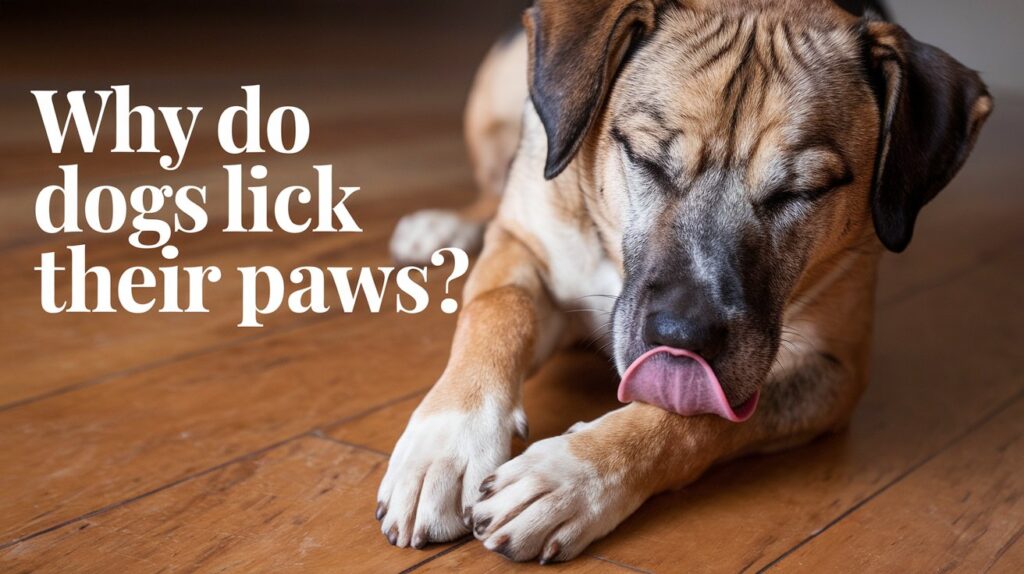
Why Do Dogs Lick Their Paws?
Dogs licking their paws is a common behavior that most dog owners have observed at some point. While it might seem harmless, there are times when paw licking can indicate something more serious. Understanding why dogs engage in this behavior is essential for their overall health and well-being. Whether it’s a simple grooming habit or a sign of something more concerning, knowing the reasons behind it can help you take the best care of your furry friend.
Common Reasons Why Dogs Lick Their Paws
Grooming and Cleaning
One of the most straightforward reasons dogs lick their paws is grooming. Just like cats, dogs have an instinct to clean themselves. After a walk or playtime outside, your dog might lick their paws to remove dirt, debris, or even sand and salt. This behavior is typically normal and not a cause for concern.
Allergies
Allergies are a common culprit behind excessive paw licking. Dogs can develop allergies to various substances, including food, pollen, grass, or even household cleaners. When a dog experiences an allergic reaction, it often manifests as itchiness, especially on their paws. This can lead to frequent and intense licking.
- Food Allergies: Certain ingredients in your dog’s food could be causing an allergic reaction. Common offenders include chicken, beef, dairy, and wheat. If your dog licks their paws after meals, a food allergy might be to blame.
- Environmental Allergies: Pollen, dust, mold, and grass can trigger allergic reactions in dogs. These allergens can cause itching, particularly on their paws, leading to excessive licking.
Parasites and Infections
Parasites and infections can also cause a dog to lick their paws persistently.
- Fleas, Ticks, and Mites: These tiny creatures can cause significant discomfort. Fleas and mites, in particular, are notorious for causing intense itching, which may lead your dog to lick and chew at their paws.
- Fungal and Bacterial Infections: Sometimes, a fungal or bacterial infection can develop between your dog’s toes. This can be quite irritating, prompting your dog to lick their paws excessively.
Pain and Discomfort
If your dog has injured their paw, they may lick it to soothe the pain. This could be due to a cut, thorn, or even a broken nail. Additionally, older dogs with arthritis or joint pain may lick their paws as a way of coping with the discomfort.
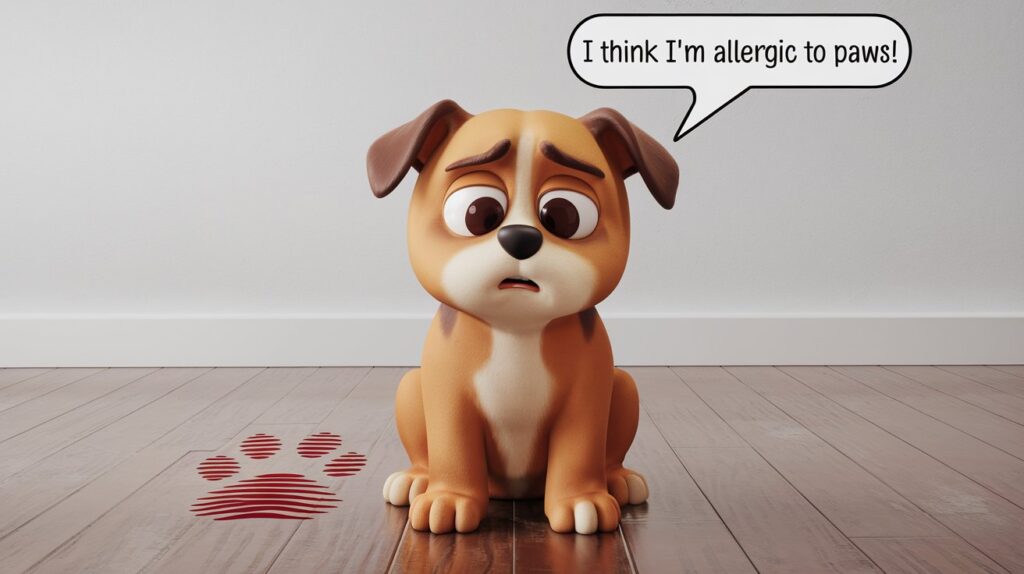
Psychological Reasons for Paw Licking
Anxiety and Stress
Dogs, like humans, can experience anxiety and stress. Paw licking can be a coping mechanism for dogs dealing with anxiety. This behavior is similar to how some people bite their nails when they’re nervous. Stressful situations such as moving to a new home, the arrival of a new pet, or even loud noises like fireworks can trigger this behavior.
Boredom
Dogs are active and intelligent animals that need both mental and physical stimulation. If your dog is left alone for long periods or doesn’t get enough exercise, they might start licking their paws out of boredom. If not treated in time, this behavior can become a habit.
Obsessive-Compulsive Behavior
In some cases, paw licking can become an obsessive-compulsive behavior (OCD). This is more serious and can be challenging to manage. Dogs with OCD might lick their paws obsessively, even to the point of causing injury. If you notice your dog licking their paws excessively and there’s no obvious cause, it might be time to consult with a veterinarian or animal behaviorist.
Environmental Factors Contributing to Paw Licking
Seasonal Changes
The changing seasons can have an impact on your dog’s paw health. In winter, salt and ice-melting chemicals can irritate their paws, leading to licking. In spring and summer, pollen and grass can cause allergic reactions that result in paw licking.
Chemical Irritants
Household cleaners, floor polish, and lawn chemicals can also be irritants. If your dog comes into contact with these substances, they might lick their paws to relieve the irritation. Always make sure your home is safe for your pets by using pet-friendly products.
When to Worry About Paw Licking
Persistent and Excessive Licking
While occasional paw licking is normal, persistent and excessive licking is not. If your dog is licking their paws constantly, it could be a sign of a deeper issue that requires attention.
Open Sores and Infections
Excessive licking can lead to open sores, which can become infected. If you notice any redness, swelling, or discharge from your dog’s paws, it’s time to visit the vet. Infections can be painful and may require antibiotics or other treatments.
Changes in Behavior
If your dog’s paw licking is accompanied by other changes in behavior, such as lethargy, loss of appetite, or aggression, it could indicate a more serious health issue. Don’t ignore these signs—your dog might be trying to tell you something important.
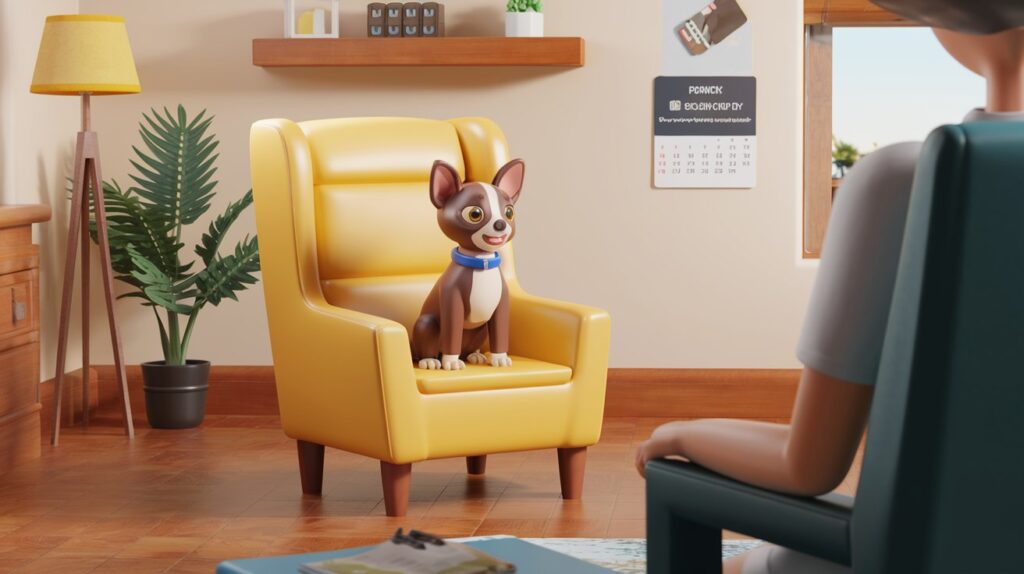
How to Help Your Dog Stop Licking Their Paws
Proper Grooming
Regular grooming can help prevent paw licking. Check your dog’s paws frequently for any signs of injury, parasites, or irritants. Keeping their paws clean and trimmed will reduce the chances of them licking due to discomfort.
Addressing Allergies and Irritants
If allergies are the cause, work with your vet to identify the specific allergen. Once you know what’s causing the reaction, you can take steps to eliminate it from your dog’s environment or diet.
Providing Mental and Physical Stimulation
Keep your dog mentally and physically engaged with regular exercise, toys, and interactive playtime. This can reduce boredom and anxiety, which are common triggers for paw licking.
Seeking Professional Help
If you’ve tried everything and your dog is still licking their paws excessively, it might be time to seek professional help. A veterinarian can help diagnose the underlying issue and suggest appropriate treatments or therapies. In some cases, medication or behavior therapy might be necessary.
Preventing Paw Licking in Dogs: Why Do Dogs Lick Their Paws
Maintain a Clean Environment
A clean environment is key to preventing paw licking. Regularly clean your home and yard to reduce your dog’s exposure to allergens and irritants. Make sure to wash their bedding and toys frequently as well.
Regular Health Check-ups
Routine vet visits are essential for catching potential health issues early. Your vet can help you stay on top of your dog’s overall health and prevent problems before they start.
Provide a Balanced Diet
A healthy diet is crucial for your dog’s skin and coat health. Make sure your dog’s diet is well-balanced and free from common allergens. Supplements like omega-3 fatty acids can also support skin health and reduce itching.
Conclusion: Why Do Dogs Lick Their Paws
Understanding why dogs lick their paws is the first step in addressing the behavior. While it’s often harmless, excessive paw licking can be a sign of a more serious issue. By paying attention to your dog’s habits and taking proactive steps to keep them healthy, you can help prevent paw licking from becoming a problem. Remember, when in doubt, always consult with your vet to ensure your dog’s health and well-being.
FAQs: Why Do Dogs Lick Their Paws
- Why is my dog licking his paws so much?
Your dog might be licking his paws due to allergies, irritation, pain, or boredom. It’s important to monitor the behavior to determine if it’s persistent or excessive. - Is it OK to let my dog lick his paws?
Occasional paw licking is normal, but excessive licking can lead to infections or indicate an underlying problem. It’s best to address it if it becomes frequent. - What does it mean when a dog licks your feet?
When a dog licks your feet, it can be a sign of affection, submission, or an attempt to gather information about you through taste and scent. - Why does my dog lick his front legs so much?
Licking the front legs could be due to allergies, anxiety, or discomfort. It might also be a habit formed from boredom or stress.

Jahanzaib Kaleem is a passionate and knowledgeable pet writer and veterinarian dedicated to enhancing the well-being of pets and educating pet owners around the world. With years of experience in veterinary medicine and a deep love for animals, Jahanzaib combines his medical expertise with a flair for writing to deliver insightful and practical advice on pet care.

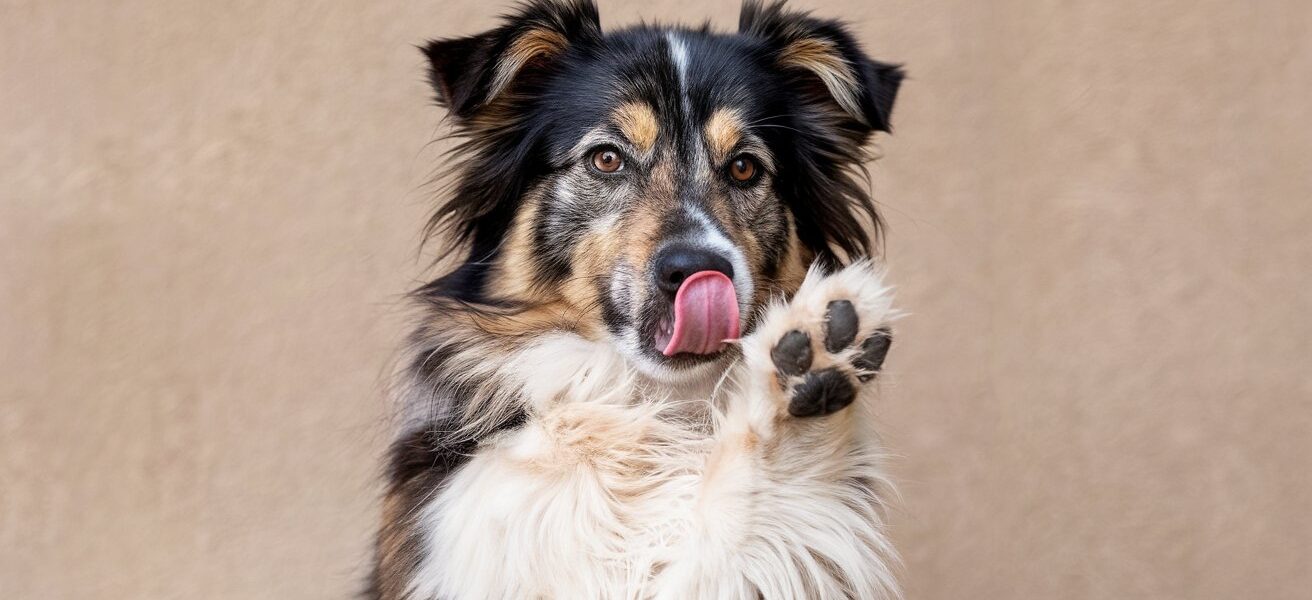

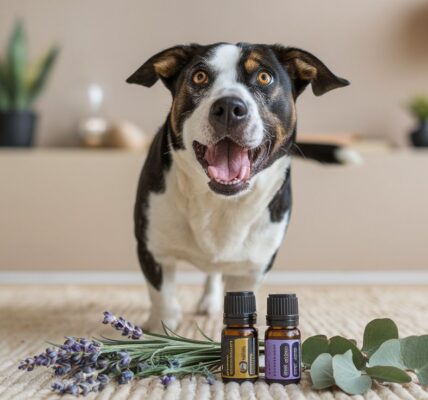


3 COMMENTS